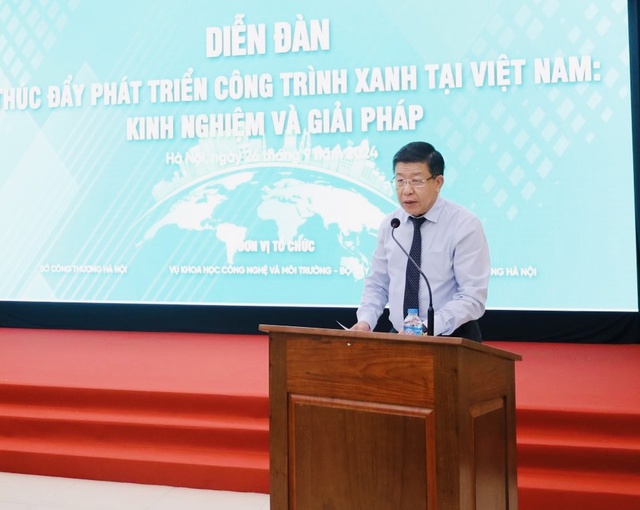Ha Noi regards smart city infrastructure development as strategic task
VGP - Promoting green building and smart urban infrastructure is a strategic task to transform Ha Noi into a green, smart, and modern city, worthy of its stature, said Vice Chairman of the Ha Noi People's Committee Duong Duc Tuan on September 26.

Vice Chairman of the Ha Noi People's Committee Duong Duc Tuan
The Vice Chairman made the point on September 26 in Ha Noi while addressing the forum titled "Promoting Green Building Development in Vietnam: Experiences and Solutions", co-organized by the Ha Noi People's Committee and the Ministry of Construction.
The city has implemented numerous significant policies to promote green buildings, smart urban infrastructure, and sustainable development.
He reaffirmed Ha Noi's commitment to developing into a green, smart, and sustainable city and called for participation and cooperation from experts, investors, consulting organizations, and individuals with experience and expertise in green urban development.
Tuan wanted investors to share practical experiences and provide advanced technical and technological solutions, building materials, and skilled labor for developing green buildings and smart urban infrastructure in Ha Noi.
The Resolution of the 17th Party Congress of Ha Noi, dated October 13, 2020 identified a vision for the city by 2030, focusing on becoming a green, smart, and modern capital.
Under the resolution, Ha Noi targets to develop green transportation, expand green spaces, and ensure that construction projects adhere to energy-saving and greenhouse gas reduction standards.
"The Ha Noi People's Committee is committed to working closely with central agencies and domestic and international partners to accelerate urban transformation, creating a green, smart, sustainable and modern capital," he said.
Deputy Minister of Construction Pham Minh Ha noted that green buildings have emerged in Viet Nam over the past 15 years. Viet Nam houses early 500 green buildings across the country, with a total floor area of about 11.5 million square meters.
According to the Ha Noi Department of Industry and Trade, it is key to resolve issues related to improving the legal framework, establishing specific standards and processes for green building construction, drafting incentive mechanisms for investors, and training and enhancing human resource capacity in the green building field.
At the same time, efforts should be made to build an information-sharing platform on green technologies, solutions, and exemplary projects, allowing stakeholders to exchange experiences. Developing the green materials market is also important, and activities to promote and recognize green materials and energy-efficient equipment will help investors and consumers better understand these products.
Ha Noi's Deputy Mayor Tuan said that green buildings need to be designed to optimize energy use and natural resources through the application of environmentally friendly materials.
Furthermore, green spaces within buildings are essential for improving microclimates, creating a healthy living environment, and enhancing the well-being of users, he said.
Modern smart urban infrastructure is also crucial for efficient urban management, Tuan noted.
"The use of advanced technologies such as the Internet of Things (IoT), artificial intelligence (AI), and big data in urban management can save resources and optimize public services," he said. "For example, smart traffic systems can help reduce congestion, save time and energy, and lower emissions from vehicles."
Ha Noi is currently drafting regulatory documents to implement the 2024 Capital Law, particularly focusing on developing green, smart, and sustainable urban policies, Tuan said.
"These regulations will provide a solid legal foundation for the long-term development of the capital in alignment with the green-smart-modern orientation," he added./.

